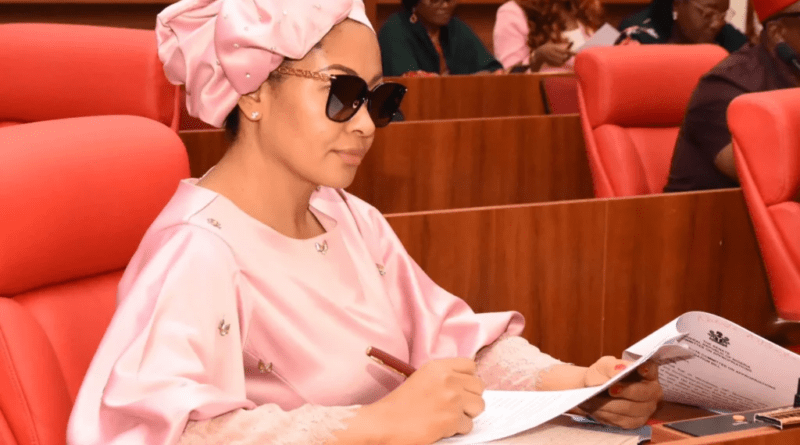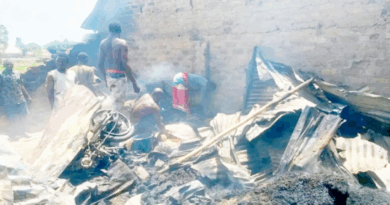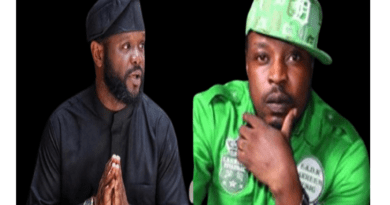“Senator Natasha Akpoti-Uduaghan Needs Clinical Evaluation Over Recent Political Outbursts”, Psychiatrist Doctor Advises
By Dr. Alex Adekunle
When I first watched the video of Senator Natasha Akpoti-Uduaghan, accusing the Senate President Godswill Akpabio and former Kogi State Governor Yahaya Bello of plotting to assassinate her, my immediate reaction was one of shock, much like many Nigerians. Given the gravity of such claims, it is natural for the public to react with concern.
However, stepping back from the emotional weight of the allegations, it is important to critically assess the situation with a rational, evidence-based approach.
Over the years, Sen. Akpoti-Uduaghan has made multiple allegations against high-profile figures in Nigeria’s political and social spheres. Some of these claims have been retracted, while others remain unsubstantiated. This pattern of unverified accusations raises questions that warrant deeper reflection. As a medical professional, I am inclined to consider multiple perspectives, including the possibility that underlying psychological or cognitive factors could play a role in shaping such public declarations.
It is crucial to preface this discussion with a key clarification: suggesting the need for a clinical evaluation is not an assertion of mental instability. Rather, it is a call for a more holistic understanding of behaviour that appears to follow a pattern of extreme accusations without accompanying evidence. In medical practice, clinical evaluations are recommended for individuals who exhibit persistent behaviours that could indicate underlying psychological factors.
One potential area of concern is the tendency to perceive powerful figures as orchestrators of personal harm. This could align with certain psychological conditions, such as persecutory delusions, where an individual strongly believes they are being targeted or conspired against despite a lack of concrete evidence. Of course, not all claims of persecution are baseless; history has shown that individuals in positions of power can engage in unethical or even criminal actions. The key issue is the necessity of verifiable evidence before such claims can be accepted as fact.
Sen. Akpoti-Uduaghan has a history of making serious allegations. A notable instance was her accusation against political commentator Reno Omokri, which was later retracted after evidence disproved the claim. Reports suggest that she compensated Omokri to avoid legal proceedings, raising questions about the basis of her initial statement. More recently, her allegations against Senate President Akpabio remain unverified, yet they continue to shape public perception.
Another incident that drew attention was her reaction to a seat reallocation in the Senate chambers. The dispute, which nearly escalated into a physical confrontation, was seen by some as an overreaction to a routine administrative decision. Emotional volatility in public engagements can sometimes indicate an underlying stress response or difficulty in managing confrontation, further supporting the need for psychological evaluation in situations where such reactions are persistent.
As a psychiatric intern, I am trained to consider multiple factors in behavioural assessment. Conditions such as borderline personality disorder (BPD) are characterized by emotional instability, impulsivity, and intense interpersonal conflicts. Similarly, delusional disorder, persecutory type, involves the firm belief that one is being targeted or conspired against despite a lack of clear evidence. Another possibility is erotomania (de Clérambault’s syndrome), where an individual believes a person of high status has a secret romantic interest in them. These are medical considerations that, while not conclusive, may provide insight into persistent behavioral patterns.
It is important to note that making clinical suggestions based on public behaviour alone has limitations. A proper evaluation can only be conducted through direct consultation, structured assessments, and clinical observation. However, in cases where public figures repeatedly make extreme claims, it is not uncommon for health professionals to raise concerns about the need for professional assessment.
Public figures wield significant influence, and their statements can shape narratives that impact governance, social trust, and national stability. When unverified claims involve accusations of assassination plots or conspiracy by state actors, the consequences can be far-reaching.
If Sen. Akpoti-Uduaghan has credible evidence to support her claims, it is in her best interest to present them through the appropriate legal and investigative channels. Such an approach would not only strengthen her credibility but also ensure that justice is served if wrongdoing has indeed occurred. Conversely, if allegations are found to be baseless, they can cause unnecessary panic, damage reputations, and divert attention from pressing national issues.
The legal system provides mechanisms for verifying claims of criminal conduct. Individuals who make serious allegations should be prepared to provide tangible proof to substantiate their assertions. In the absence of evidence, public figures have a responsibility to exercise caution in their statements, ensuring they do not incite public unrest or undermine trust in governance institutions.
It may be beneficial for Sen. Akpoti-Uduaghan to seek counsel from trusted advisors or medical professionals to ensure that her public statements are well-founded. If underlying psychological factors are contributing to her actions, professional support could provide the necessary intervention. Seeking medical evaluation does not imply weakness; rather, it is a proactive approach to ensuring that one’s well-being is safeguarded while navigating the complexities of public life.
Ultimately, this discussion is not about discrediting Sen. Akpoti-Uduaghan but rather about emphasizing the need for responsible public discourse. The suggestion for clinical evaluation is not a dismissal of her allegations but a recognition that certain patterns in public behaviour warrant deeper examination. In a democratic society, the right to free speech is essential, but it must be balanced with accountability and factual accuracy.
As a medical professional, my primary concern is well-being, both for individuals and for society at large. If there are genuine threats to Sen. Akpoti-Uduaghan’s safety, they should be thoroughly investigated through proper legal channels. However, if these claims stem from psychological distress or other factors, addressing those issues will serve her interests as well as the public’s.
In an era where misinformation spreads rapidly, it is critical to approach sensitive allegations with a commitment to truth, fairness, and professional integrity. Public figures, media houses, and health professionals all have a role to play in ensuring that national conversations remain rooted in verifiable facts rather than speculation.
Dr. Alex Adekunle A. (AAA)
Psychiatric Intern
FMC, Ilorin, Kwara State



